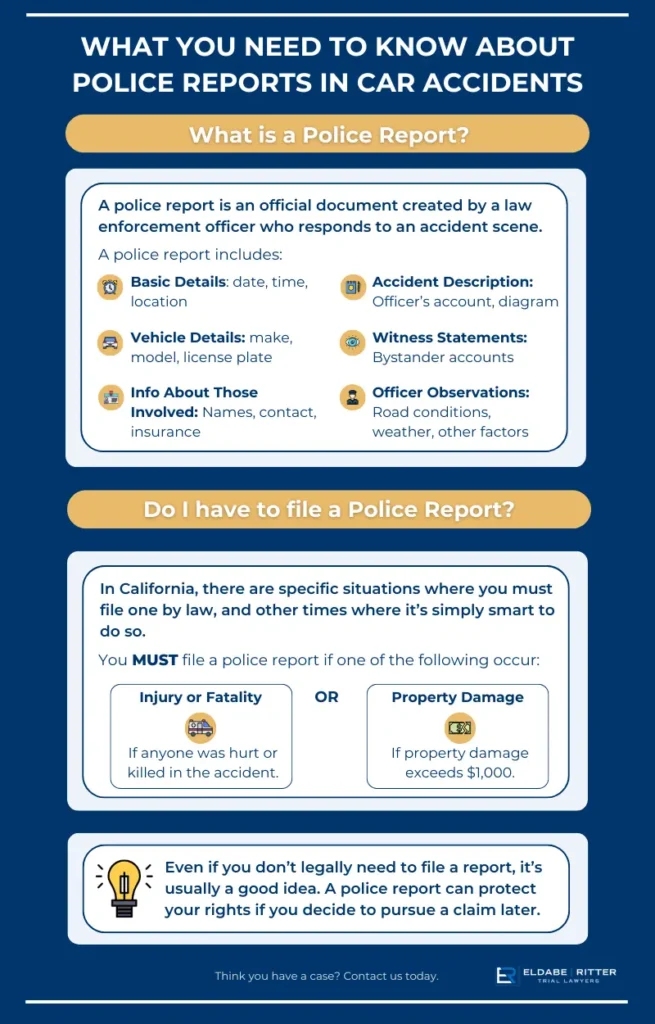After a serious car accident, one of the most important things you can do is to file a police report. Police reports are not just paperwork – they’re official records that can play a huge role in an insurance claim or lawsuit. In this article, we’ll walk you through everything you need to know about accident police reports in California.
What is a Police Report?
A police report is an official document created by a law enforcement officer who responds to an accident scene. Police reports are particularly valuable after an accident because they offer an unbiased, third-party account of the incident that you can use as evidence for an insurance claim or legal case.
Here’s what you’ll typically find in a police report for an accident:
- Basic Details: Date, time, and location of the accident.
- Information About Those Involved: Names, contact details, and insurance information for all parties involved.
- Vehicle Details: Make, model, and license plate numbers of vehicles involved.
- Description of the Accident: Officer’s notes on how the accident happened, sometimes including a diagram.
- Witness Statements: Information from any bystanders who saw what happened.
- Officer’s Observations: Details like road conditions, weather, visible injuries, or factors that may have caused the accident (e.g., speeding, traffic signs, impaired driving).
When Do I Need to File a Police Report?
After an accident, many people wonder whether they need to file a police report. In California, there are specific situations where you must file one by law, and other times where it’s simply smart to do so.
California law requires you to file a police report within 24 hours of the accident and also requires you to file an SR-1 report with the DMV within 10 days of the accident if one of the following occurs:
- Injury or Fatality: If anyone was hurt or killed in the accident.
- Property Damage: If the accident caused property damage over $1,000.
Even if you don’t legally need to file a report, it’s usually a good idea. A police report can protect your rights if you decide to pursue a claim later.
Injured in a car accident? Contact an experienced car accident lawyer at El Dabe Ritter today for a free consultation.

How to File a Police Report for a Car Accident
Filing a police report might seem intimidating, especially in the middle of a stressful situation like an accident. But the process is simpler than you might think. Here are the two main ways you can file a police report.
1. File a Report At the Scene of the Accident
Right after the accident, call the police and ask for an officer to come to the scene. The officer will ask for details about your contact information, insurance, and vehicle details. They may also ask for a description of what happened.
2. File a Report After Leaving the Scene
If an officer didn’t come to the accident scene, you can file a police report after an accident by contacting the police department in the city where the accident happened. Some cities in California also allow you to file online. Check the website of the local police department or the CHP to see if this is an option. When filing, be ready to share the accident date, time, location, and a description of what happened.
How to Get a Copy of Your Police Report
You may need to obtain a copy of your police report for your records or to support an insurance claim. Here’s how to get a police report:
- Contact the Correct Agency: Request a copy of the report from the police department, sheriff, or CHP where the accident occurred.
- Provide Identification: You’ll usually need a photo ID and the report number (or the date and location of the accident if you don’t know the report number).
- Wait for Processing: It may take several days or even weeks for the report to be available, depending on the agency.
How Much Does a Police Report Cost in California?
In California, obtaining a police report usually comes with a fee, which can vary depending on the department and the type of copy you need. Here’s a general breakdown:
- For a Basic Copy: Most agencies charge around $10 to $25.
- For a Certified Copy: If you need a certified copy for court, this may cost a bit more.
If you’re concerned about the cost, some agencies may offer fee waivers or financial help, especially for those with limited resources.
The Role of a Police Report in Your Injury Claim
A police report can be a valuable piece of evidence in any injury claim or lawsuit following an accident. It’s an unbiased, third-party account of what happened, and it often contains critical information that can help establish fault. It is often a key part of an injury claim because it provides evidence and it may be used in court to support your claim. Having this record can make it easier to work with insurance companies or the court to seek compensation for your injuries and damages.
Frequently Asked Questions (FAQs)
Where do I need to file a police accident report?
If the accident occurred in the city, contact the local police. If the accident occurred in a region that isn’t governed by a local city or government, contact the county sheriff. And lastly, if the accident occurred on a state highway or a freeway, contact the CHP.
How to Obtain A Police Report Online
Visit the law enforcement agency’s website where the report was filed. Look for an “Accident Reports” or “Records” section and follow their steps for online requests.
Is Police Recording Attached with a Police Report?
Recordings are typically not included with a police report. To get dashcam or bodycam footage, you may need to file a separate request with the agency.
What Happens When You File A Police Report?
Filing a police report creates an official record with important details about the accident. It can help establish fault and support any insurance or legal claims you may pursue.
Can You Make A Police Report After An Accident?
Yes, you can file a report after leaving the scene by contacting the local police department, sheriff’s office, or CHP where the accident took place.
How To File a Hit and Run Police Report
Immediately contact law enforcement after a hit and run accident. Share details about the hit-and-run, including time, location, witness info, and any identifying details of the fleeing vehicle.
Can Police Refuse to Take A Report?
A police officer may decline to file a report at the scene of the accident if the incident doesn’t meet the legal requirements, like minor accidents with no injuries or minimal damage. If police refuse to take a report in a situation, contact the CHP or local police department to file a report yourself.
Get Help From a Personal Injury Lawyer at El Dabe Ritter Trial Lawyers
If you’ve been injured in a car accident and need help building a strong case for your claim, contact the car accident attorneys at El Dabe Ritter. The passionate attorneys at our law firm will protect the value of your claim to ensure you get the compensation you deserve. Call now for a free case evaluation.

